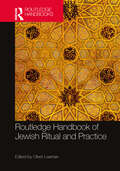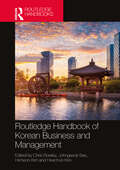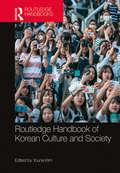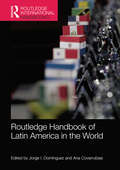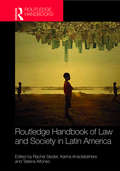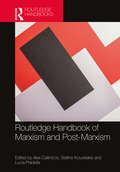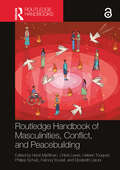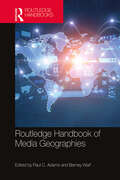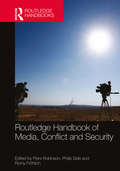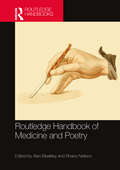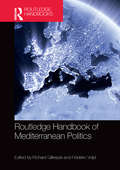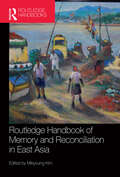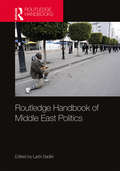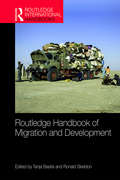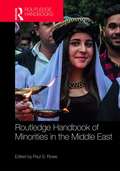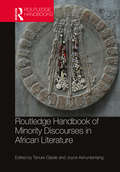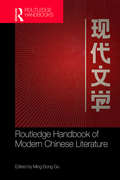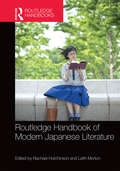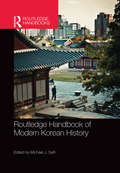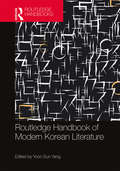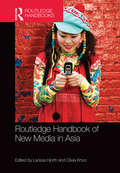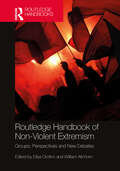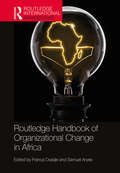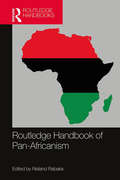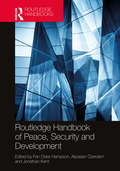- Table View
- List View
Routledge Handbook of Jewish Ritual and Practice
by Oliver LeamanRitual and practice are some of the most defining features of religion, linked with its central beliefs. Discussing the wide range of Jewish ritual and practice, this volume provides a contemporary guide to this significant aspect of religious life and experience. Drawing on a wide range of disciplines, this volume describes not only what takes place, but the reasons behind this and the implications both the theory and practice have for our understanding of Judaism. Organized in terms of texts, periods, practices, languages and relationships with the other, the book includes accounts of prayer, food, history, synagogues and the various legal and ideological debates that exist within Judaism with the focus on how they influence practice. Coming at a time of renewed interest in the role of the body in religion, this book aims to bring the theoretical and scriptural issues which arise in this area of Jewish life and culture up to date. This volume is aimed at students and researchers working in Jewish studies specifically, and religious studies in general. Designed to be helpful to those on courses in relevant areas, especially in the United States, this book includes substantial bibliographical material.
Routledge Handbook of Korean Business and Management
by Chris Rowley Johngseok Bae , Hicheon Kim and Heechun KimThis Handbook, authored by a stellar line-up of international contributors, explores the diverse phenomena and issues surrounding the Korean business and management world.Offering insights into trends, challenges, policies and initiatives of corporations and government and providing a nuanced portrayal of Korean business dynamics, the Handbook’s approach is centred around four key themes: Examining the roles played by the government and markets, including labour and financial markets, in Korea’s economic progression. Addressing macro and micro issues in Korean business and management such as business groups, business-government relationships, corporate governance, corporate strategy and globalization, human resource management, employment relations, and chief executive officer (CEO) compensation. Scrutinizing current phenomena by bridging the past and future, exploring mainstream and emerging business issues such as corporate social responsibility, environmental, social, and governance issues, start-up businesses, diversity and inclusion and the impact of the Fourth Industrial Revolution. Emphasizing the interplay between agents, structures and institutions. Delving into the intricacies of business and management in a Korean context, this Handbook will be a valuable resource to students and scholars of international business and management, with a particular focus on Asia and Korea.
Routledge Handbook of Korean Culture and Society
by Youna KimThe Routledge Handbook of Korean Culture and Society is an accessible and interdisciplinary resource that explores the formation and transformation of Korean culture and society. Each chapter provides a comprehensive and thought-provoking overview on key topics, including: compressed modernity, religion, educational migration, social class and inequality, popular culture, digitalisation, diasporic cultures and cosmopolitanism. These topics are thoroughly explored by an international team of Korea experts, who provide historical context, examine key issues and debates, and highlight emerging questions in order to set the research agenda for the near future. Providing an interdisciplinary overview of Korean culture and society, this Handbook is an essential read for undergraduate and postgraduate students, as well scholars in Korean Studies, Cultural Studies, Sociology, Anthropology, and Asian Studies in general.
Routledge Handbook of Latin America in the World
by Jorge I. Domínguez and Ana CovarrubiasThe Handbook of Latin America in the World explains how the Latin American countries have both reacted and contributed to changing international dynamics over the last 30 years. It provides a comprehensive picture of Latin America’s global engagement by looking at specific processes and issues that link governments and other actors, social and economic, within the region and beyond. Leading scholars offer an up-to-date state of the field, theoretically and empirically, thus avoiding a narrow descriptive approach. The Handbook includes a section on theoretical approaches that analyze Latin America’s place in the international political and economic system and its foreign policy making. Other sections focus on the main countries, actors, and issues in Latin America’s international relations. In so doing, the book sheds light on the complexity of the international relations of selected countries, and on their efforts to act multilaterally. The Routledge Handbook of Latin America in the World is a must-have reference for academics, researchers, and students in the fields of Latin American politics, international relations, and area specialists of all regions of the world.
Routledge Handbook of Law and Society in Latin America
by Rachel Sieder Karina Ansolabehere Tatiana A. Alfonso SierraAn understanding of law and its efficacy in Latin America demands concepts distinct from the hegemonic notions of "rule of law" which have dominated debates on law, politics and society, and that recognize the diversity of situations and contexts characterizing the region. The Routledge Handbook of Law and Society in Latin America presents cutting-edge analysis of the central theoretical and applied areas of enquiry in socio-legal studies in the region by leading figures in the study of law and society from Latin America, North America and Europe. Contributors argue that scholarship about Latin America has made vital contributions to longstanding and emerging theoretical and methodological debates on the relationship between law and society. Key topics examined include: The gap between law-on-the-books and law in action The implications of legal pluralism and legal globalization The legacies of experiences of transitional justice Emerging forms of socio-legal and political mobilization Debates concerning the relationship between the legal and the illegal. The Routledge Handbook of Law and Society in Latin America sets out new research agendas for cross-disciplinary socio-legal studies and will be of interest to those studying law, sociology of law, comparative Latin American politics, legal anthropology and development studies.
Routledge Handbook of Marxism and Post-Marxism
by Alex Callinicos; Stathis Kouvelakis; Lucia PradellaIn the past two decades, Marxism has enjoyed a revitalization as a research program and a growth in its audience. This renaissance is connected to the revival of anti-capitalist contestation since the Seattle protests in 1999 and the impact of the global economic and financial crisis in 2007–8. It intersects with the emergence of Post-Marxism since the 1980s represented by thinkers such as Jürgen Habermas, Chantal Mouffe, Ranajit Guha and Alain Badiou. This handbook explores the development of Marxism and Post-Marxism, setting them in dialogue against a truly global backdrop. Transcending the disciplinary boundaries between philosophy, economics, politics and history, an international range of expert contributors guide the reader through the main varieties and preoccupations of Marxism and Post-Marxism. Through a series of framing and illustrative essays, readers will explore these traditions, starting from Marx and Engels themselves, through the thinkers of the Second and Third Internationals (Rosa Luxemburg, Lenin and Trotsky, among others), the Tricontinental, and Subaltern and Post-Colonial Studies, to more contemporary figures such as Huey Newton, Fredric Jameson, Judith Butler, Immanuel Wallerstein and Samir Amin. The Routledge Handbook of Marxism and Post-Marxism will be of interest to scholars and researchers of philosophy, cultural studies and theory, sociology, political economics and several areas of political science, including political theory, Marxism, political ideologies and critical theory.
Routledge Handbook of Masculinities, Conflict, and Peacebuilding
by Heleen Touquet Henri Myrttinen Farooq Yousaf Philipp Schulz Chloé Lewis Elizabeth LaruniThis handbook engages with and broadens current debates on men and masculinities in conflict and peacebuilding.Through an expansive range of chapters across a unique array of geographical settings, the volume shatters prevailing assumptions about men’s relationship to conflict and its wake. Situated across scholarship, policy, and practice, the contributions offer new possibilities for a more complex and complete picture of the gendered tapestries of conflict, peace, and the spaces in between. The handbook combines feminist, intersectional, relational, decolonial, and queer perspectives on the conceptualisation of masculinities in conflict and peacebuilding. This approach provides us with the tools to go beyond direct, physical, conflict-related violence to examine less visible forms of violence and power as well as other ways in which masculinities interact with conflict and peace. In doing so, the book permits a multi-faceted view of men’s roles, relationships, vulnerabilities, and non-violent agencies in conflict and peacebuilding across scholarship, policy, and practice.This book will be of much interest to students of gender, masculinities, peace and conflict studies, and international relations.Chapter 1, 3, 9, 13, and 30 of this book are freely available as a downloadable Open Access PDF at http://www.taylorfrancis.com under a Creative Commons Attribution-Non Commercial-No Derivatives (CC-BY-NC-ND) 4.0 license.Chapter 25 of this book is freely available as a downloadable Open Access PDF at http://www.taylorfrancis.com under a Creative Commons Attribution (CC-BY) 4.0 license.
Routledge Handbook of Media Geographies
by Paul C. AdamsThis Handbook offers a comprehensive overview of media geography, focusing on a range of different media viewed through the lenses of human geography and media theory. It addresses the spatial practices and processes associated with both old and new media, considering "media" not just as technologies and infrastructures, but also as networks, systems and assemblages of things that come together to enable communication in the real world. With contributions from academics specializing in geography and media studies, the Routledge Handbook of Media Geographies summarizes the recent developments in the field and explores key questions and challenges affecting various groups, such as women, minorities, and persons with visual impairment. It considers geographical aspects of disruptive media uses such as hacking, fake news, and racism. Written in an approachable style, chapters consider geographies of users, norms, rules, laws, values, attitudes, routines, customs, markets, and power relations. They shed light on how mobile media make users vulnerable to tracking and surveillance but also facilitate innovative forms of mobility, space perception and placemaking. Structured in four distinct sections centered around "control and access to digital media," "mass media," "mobile media and surveillance" and "media and the politics of knowledge," the Handbook explores digital divides and other manifestations of the uneven geographies of power. It also includes an overview of the alternative social media universe created by the Chinese government. Media geography is a burgeoning field of study that lies at the intersections of various social sciences, including human geography, political science, sociology, anthropology, communication/media studies, urban studies, and women and gender studies. Academics and students across these fields will greatly benefit from this Handbook.
Routledge Handbook of Media, Conflict and Security
by Philip Seib Piers Robinson Romy FrohlichThis Handbook links the growing body of media and conflict research with the field of security studies. The academic sub-field of media and conflict has developed and expanded greatly over the past two decades. Operating across a diverse range of academic disciplines, academics are studying the impact the media has on governments pursuing war, responses to humanitarian crises and violent political struggles, and the role of the media as a facilitator of, and a threat to, both peace building and conflict prevention. This handbook seeks to consolidate existing knowledge by linking the body of conflict and media studies with work in security studies. The handbook is arranged into five parts: Theory and Principles. Media, the State and War Media and Human Security Media and Policymaking within the Security State New Issues in Security and Conflict and Future Directions For scholars of security studies, this handbook will provide a key point of reference for state of the art scholarship concerning the media-security nexus; for scholars of communication and media studies, the handbook will provide a comprehensive mapping of the media-conflict field.
Routledge Handbook of Medicine and Poetry
by Shane Neilson Alan BleakleyThe Routledge Handbook of Medicine and Poetry draws on an international selection of authors to ask what the cultures of poetry and medicine may gain from reciprocal critical engagement. The volume celebrates interdisciplinary inquiry, critique, and creative expansion with an emphasis upon amplifying provocative and marginalized voices.This carefully curated collection offers both historical context and future thinking from clinicians, poets, artists, humanities scholars, social scientists, and bio-scientists who collectively inquire into the nature of relationships between medicine and poetry. Importantly, these can be both productive and unproductive. How, for example, do poet-doctors reconcile the outwardly antithetical approaches of bio-scientific medicine and poetry in their daily work, where typically the former draws on technical language and associated thinking and the latter on metaphors? How does non-narrative lyrical poetry engage with narrative-based medicine? How do poets writing about medicine identify as patients? Central to the volume is the critical investigation of the consequences of varieties of medical pedagogy for clinical practice.Presenting a vision of how poetic thinking might form a medical ontology this thought-provoking book affords an essential resource for scholars and practitioners from across medicine, health and social care, medical education, the medical and health humanities, and literary studies.
Routledge Handbook of Mediterranean Politics
by Richard Gillespie Frédéric VolpiThe Mediterranean space, defined by a major sea, a large number of littoral countries and to some extent their hinterlands, is at the same time an interface between Europe, Africa and Asia. This brings complex challenges in terms of achieving peace and stability. Recently it has received intense international attention through the internal destructiveness and spill-over from conflicts, primarily those waged in Libya, Syria and, more remotely, Iraq. This Handbook provides an overview of the political processes that shape the Mediterranean region in the contemporary context. It explores the issues of crucial importance to Mediterranean dynamics through a series of analytical sections that guide the reader towards a comprehensive understanding of the main regional interactions and trends. The Handbook explores: the complex historical formation of the contemporary Mediterranean geopolitical perspectives issues around peace and conflict the political economy of the region the role of non-state actors and social movements societal and cultural trends. The wide range of contributions from many of the leading academic experts on the region offers not only insights into the debates and processes that structure each theme, but also key pointers for a more general understanding of how distinct political, economic, social and cultural dynamics interact across the region. It will therefore be a key resource for policy-makers and students and scholars of Mediterranean politics and international relations.
Routledge Handbook of Memory and Reconciliation in East Asia
by Mikyoung KimDecades after the end of the World War II East Asia continues to struggle with lingering animosities and unresolved historical grievances in domestic, bilateral and regional memory landscapes. China, Japan and the Korea share a history of inter- and intra-violence, self-other identity construction and diametrically opposed interpretations of the past. Routledge Handbook of Memory and Reconciliation in East Asia offers a complete overview of the challenges of national memory and ideological rivalry for reconciliation in the East Asian region. Chapters provide authoritative analyses of contentious issues such as comfort women, the Nanjing massacre, history textbook controversies, shared heritage sites, colonial rule, territorial disputes and restitution. By interweaving memory, human rights and reconciliation the contributors actively explore real prospects of redressing past wrongs and achieving peaceful coexistence at personal as well as governmental levels. Bringing together an international team of experts, this book is an essential read for students and scholars of East Asian studies, anthropology, gender studies, history, international relations, law, political science, and sociology, and for those interested in memory and reconciliation issues.
Routledge Handbook of Middle East Politics
by Larbi SadikiDrawing on various perspectives and analysis, the Handbook problematizes Middle East politics through an interdisciplinary prism, seeking a melioristic account of the field. Thematically organized, the chapters address political, social, and historical questions by showcasing both theoretical and empirical insights, all of which are represented in a style that ease readers into sophisticated induction in the Middle East. It positions the didactic at the centre of inquiry. Contributions by forty-four scholars, both veterans and newcomers, rethink knowledge frames, conceptual categories, and fieldwork praxis. Substantive themes include secularity and religion, gender, democracy, authoritarianism, and new "borderline" politics of the Middle East. Like any field of knowledge, the Middle East is constituted by texts, authors, and readers, but also by the cultural, spatial, and temporal contexts within which diverse intellectual inflections help construct (write–speak) academic meaning, knowing, and practice. By denaturalizing notions of singularity of authorship or scholarship, the Handbook plants a dialogic interplay animated by multi-vocality, multi-modality, and multi-disciplinarity. Targeting graduate students and young scholars of political and social sciences, the Handbook is significant for understanding how the Middle East is written and re-written, read and re-read (epistemology, methodology), and for how it comes to exist (ontology).
Routledge Handbook of Migration and Development (Routledge International Handbooks)
by Ronald Skeldon Tanja BastiaThe Routledge Handbook of Migration and Development provides an interdisciplinary, agenda-setting survey of the fields of migration and development, bringing together over 60 expert contributors from around the world to chart current and future trends in research on this topic. The links between migration and development can be traced back to the post-war period, if not further, yet it is only in the last 20 years that the 'migration–development nexus' has risen to prominence for academics and policymakers. Starting by mapping the different theoretical approaches to migration and development, this book goes on to present cutting edge research in poverty and inequality, displacement, climate change, health, family, social policy, interventions, and the key challenges surrounding migration and development. While much of the migration literature continues to be dominated by US and British perspectives, this volume includes original contributions from most regions of the world to offer alternative non-Anglophone perspectives. Given the increasing importance of migration in both international development and current affairs, the Routledge Handbook of Migration and Development will be of interest both to policymakers and to students and researchers of geography, development studies, political science, sociology, demography, and development economics.
Routledge Handbook of Minorities in the Middle East
by Paul S RoweThe Routledge Handbook of Minorities in the Middle East gathers a diverse team of international scholars, each of whom provides unique expertise into the status and prospects of minority populations in the region. The dramatic events of the past decade, from the Arab Spring protests to the rise of the Islamic state, have brought the status of these populations onto centre stage. The overturn of various long-term autocratic governments in states such as Tunisia, Egypt, Libya, and Yemen, and the ongoing threat to government stability in Syria, Iraq, and Lebanon have all contributed to a new assertion of majoritarian politics amid demands for democratization and regime change. In the midst of the dramatic changes and latent armed conflict, minority populations have been targeted, marginalized, and victimized. Calls for social and political change have led many to contemplate the ways in which citizenship and governance may be changed to accommodate minorities – or indeed if such change is possible. At a time when the survival of minority populations and the utility of the label minority has been challenged, this handbook answers the following set of research questions.What are the unique challenges of minority populations in the Middle East? How do minority populations integrate into their host societies, both as a function of their own internal choices, and as a response to majoritarian consensus on their status? Finally, given their inherent challenges, and the vast, sweeping changes that have taken place in the region over the past decade, what is the future of these minority populations? What impact have minority populations had on their societies, and to what extent will they remain prominent actors in their respective settings? This handbook presents leading-edge research on a wide variety of religious, ethnic, and other minority populations. By reclaiming the notion of minorities in Middle Eastern settings, we seek to highlight the agency of minority communities in defining their past, present, and future.
Routledge Handbook of Minority Discourses in African Literature
by Tanure Ojaide Joyce AshuntantangThis handbook provides a critical overview of literature dealing with groups of people or regions that suffer marginalization within Africa. The contributors examine a multiplicity of minority discourses expressed in African literature, including those who are culturally, socially, politically, religiously, economically, and sexually marginalized in literary and artistic creations. Chapters and sections of the book are structured to identify major areas of minority articulation of their condition and strategies deployed against the repression, persecution, oppression, suppression, domination, and tyranny of the majority or dominant group. Bringing together diverse perspectives to give a holistic representation of the African reality, this handbook is an important read for scholars and students of comparative and postcolonial literature and African studies.
Routledge Handbook of Modern Chinese Literature
by Ming Dong GuThe Routledge Handbook of Modern Chinese Literature presents a comprehensive overview of Chinese literature from the 1910s to the present day. Featuring detailed studies of selected masterpieces, it adopts a thematic-comparative approach. By developing an innovative conceptual framework predicated on a new theory of periodization, it thus situates Chinese literature in the context of world literature, and the forces of globalization. Each section consists of a series of contributions examining the major literary genres, including fiction, poetry, essay drama and film. Offering an exciting account of the century-long process of literary modernization in China, the handbook’s themes include: Modernization of people and writing Realism, rmanticism and mdernist asthetics Chinese literature on the stage and screen Patriotism, war and revolution Feminism, liberalism and socialism Literature of reform, reflection and experimentation Literature of Taiwan, Hong Kong and new media This handbook provides an integration of biographical narrative with textual analysis, maintaining a subtle balance between comprehensive overview and in-depth examination. As such, it is an essential reference guide for all students and scholars of Chinese literature.
Routledge Handbook of Modern Japanese Literature
by Rachael Hutchinson and Leith MortonThe Routledge Handbook of Modern Japanese Literature provides a comprehensive overview of how we study Japanese literature today. Rather than taking a purely chronological approach to the content, the chapters survey the state of the field through a number of pressing issues and themes, examining the ways in which it is possible to read modern Japanese literature and situate it in relation to critical theory. The Handbook examines various modes of literary production (such as fiction, poetry, and critical essays) as distinct forms of expression that nonetheless are closely interrelated. Attention is drawn to the idea of the bunjin as a ‘person of letters’ and a more realistic assessment is provided of how writers have engaged with ideas – not labelled a ‘novelist’ or ‘poet’, but a ‘writer’ who may at one time or another choose to write in various forms. The book provides an overview of major authors and genres by situating them within broader themes that have defined the way writers have produced literature in modern Japan, as well as how those works have been read and understood by different readers in different time periods. The Routledge Handbook of Modern Japanese Literature draws from an international array of established experts in the field as well as promising young researchers. It represents a wide variety of critical approaches, giving the study a broad range of perspectives. This handbook will be of interest to students and scholars of Asian Studies, Literature, Sociology, Critical Theory, and History.
Routledge Handbook of Modern Korean History
by Michael J SethBeginning in the mid-nineteenth century when Korea became entangled in the world of modern imperialism and the old social, economic and political order began to change; this handbook brings together cutting edge scholarship on major themes in Korean History. Contributions by experts in the field cover the Late Choson and Colonial periods, Korea’s partition and the diverging paths of North and South Korea. Topics covered include: The division of Korea Religion Competing imperialisms Economic change War and rebellions Nationalism Gender North Korea Under Kim Jong Il Global Korea The Handbook provides a stimulating introduction to the most important themes within the subject area, and is an invaluable reference work for any student and researcher of Korean History.
Routledge Handbook of Modern Korean Literature
by Yoon Sun YangThe Routledge Handbook of Modern Korean Literature provides a comprehensive overview of a Korean literary tradition, which is understood as a multifaceted nexus of practices, both homegrown and transnational. The handbook discusses the perspectives from which modern Korean literature has thus far been defined, analyzing which voices have been enunciated, underappreciated, or completely silenced and how we can enrich our understanding of it. Taking up diverse transnational and interdisciplinary standpoints, this volume aims to encourage readers not to treat modern Korean literature as a self-evident category but to examine it anew as an uncultivated and uncharted space, unearthing its internal chasms and global connections. Divided into five parts, the themes covered include the following: Literature and power Borders and boundaries Rationality in literature and its limits Language, ethnicity, and translation Korean literature in the changing mediascape. By introducing new conceptual paradigms to the field of modern Korean literature, this book will appeal to students and scholars of Korean, East Asian, and world literature alike.
Routledge Handbook of New Media in Asia
by Larissa Hjorth and Olivia KhooWhile a decade ago much of the discussion of new media in Asia was couched in Occidental notions of Asia as a "default setting" for technology in the future, today we are seeing a much more complex picture of contesting new media practices and production. As "new media" becomes increasingly an everyday reality for young and old across Asia through smartphones and associated devices, boundaries between art, new media, and the everyday are transformed. This Handbook addresses the historical, social, cultural, political, philosophical, artistic and economic dimensions of the region’s new media. Through an interdisciplinary revision of both "new media" and "Asia" the contributors provide new insights into the complex and contesting terrains of both notions. The Routledge Handbook of New Media in Asia will be the definitive publication for readers interested in comprehending all the various aspects of new media in Asia. It provides an authoritative, up-to-date, intellectually broad, conceptually cutting-edge guide to the important aspects of new media in the region — as the first point of consultation for researchers, advanced level undergraduate and postgraduate students in fields of new media and Asian studies.
Routledge Handbook of Non-Violent Extremism: Groups, Perspectives and New Debates
by William Allchorn Elisa OrofinoThis Handbook provides the first in-depth analysis of non-violent extremism across different ideologies and geographic centres, a topic overshadowed until now by the political and academic focus on violent and jihadi extremism in the Global North. Whilst acknowledging the potentiality of non-violent extremism as a precursor to terrorism, this Handbook argues that non-violent extremism ought to be considered a stand-alone area of study. Focusing on Islamist, Buddhist, Hindu, far-right, far-left, environmentalist and feminist manifestations, the Handbook discusses the ideological foundation of their ‘war on ideas’ against the prevailing socio-political and cultural systems in which they operate, and provides an empirical examination of their main claims and perspectives. This is supplemented by a truly global overview of non-violent extremist groups not only in Europe and the United States, but also in Africa, Asia, Oceania and the Middle East. The Handbook thus answers a call to decolonise knowledge that is especially prescient given both the complicity of non-violent extremists with authoritarian states and the dynamic of oppression towards more progressive groups in the Global South. The Handbook will appeal to those studying extremism, radicalisation and terrorism. It intersects several relevant disciplines, including social movement studies, political science, criminology, Islamic studies and anthropology.
Routledge Handbook of Organizational Change in Africa (Routledge International Handbooks)
by Franca Ovadje Samuel AryeeAlthough change management and therefore effective adaptation to environmental complexity is considered a uniquely human cultural activity, the extensive change management literature is largely based on the experiences of organizations in the advanced economies of the West. As the economies of African countries become increasingly open, African organizations will need to be agile in order to adapt and grow in a dynamic, global environment. Currently, there is a dearth of contextualized knowledge on change management within Africa, but this handbook aims to address this by bringing together a wide range of experts to explore organizational change and change management from an African context. The handbook adopts a multidisciplinary (historical, philosophical, processual, and strategic) perspective as well as empirical accounts of change management. It addresses such issues as: What are the external and internal pressures for change? What is the content and process of change management? What are the essentials of effective change management? How can change management be theorized from an African perspective? What sort of leadership can best align with change management demands in an African context? How do organizations build internal change management capability? It is hoped that answers to these questions contained in the handbook will provide a contextualized understanding of change management which African organizations and scholars can leverage to respond to the threats and opportunities inherent in their increasingly dynamic environment. The handbook should constitute an essential reference for academics, researchers, and advanced students of change management, development studies, and African studies, as well as practitioners.
Routledge Handbook of Pan-Africanism
by Reiland RabakaThe Routledge Handbook of Pan-Africanism provides an international, intersectional, and interdisciplinary overview of, and approach to, Pan-Africanism, making an invaluable contribution to the ongoing evolution of Pan-Africanism and demonstrating its continued significance in the 21st century. The handbook features expert introductions to, and critical explorations of, the most important historic and current subjects, theories, and controversies of Pan-Africanism and the evolution of black internationalism. Pan-Africanism is explored and critically engaged from different disciplinary points of view, emphasizing the multiplicity of perspectives and foregrounding an intersectional approach. The contributors provide erudite discussions of black internationalism, black feminism, African feminism, and queer Pan-Africanism alongside surveys of black nationalism, black consciousness, and Caribbean Pan-Africanism. Chapters on neo-colonialism, decolonization, and Africanization give way to chapters on African social movements, the African Union, and the African Renaissance. Pan-African aesthetics are probed via literature and music, illustrating the black internationalist impulse in myriad continental and diasporan artists’ work. Including 36 chapters by acclaimed established and emerging scholars, the handbook is organized into seven parts, each centered around a comprehensive theme: Intellectual origins, historical evolution, and radical politics of Pan-Africanism Pan-Africanist theories Pan-Africanism in the African diaspora Pan-Africanism in Africa Literary Pan-Africanism Musical Pan-Africanism The contemporary and continued relevance of Pan-Africanism in the 21st century The Routledge Handbook of Pan-Africanism is an indispensable source for scholars and students with research interests in continental and diasporan African history, sociology, politics, economics, and aesthetics. It will also be a very valuable resource for those working in interdisciplinary fields, such as African studies, African American studies, Caribbean studies, decolonial studies, postcolonial studies, women and gender studies, and queer studies.
Routledge Handbook of Peace, Security and Development
by Fen Osler HampsonThis Handbook offers a comprehensive examination of the peace, security, and development nexus from a global perspective, and investigates the interfaces of these issues in a context characterised by many new challenges. By bringing together more than 40 leading experts and commentators from across the world, the Handbook maps the various research agendas related to these three themes, taking stock of existing work and debates, while outlining areas for further engagement. In doing so, the chapters may serve as a primer for new researchers while also informing the wider scholarly community about the latest research trends and innovations. The volume is split into three thematic parts: Concepts and approaches New drivers of conflict, insecurity, and developmental challenges Actors, institutions, and processes. For ease of use and organisational consistency, each chapter provides readers with an overview of each research area, a review of the state of the literature, a summary of the major debates, and promising directions for future research. This Handbook will be of much interest to students of peace and conflict studies, development studies, security studies, and International Relations.
